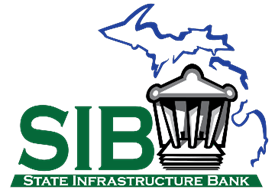The web Browser you are currently using is unsupported, and some features of this site may not work as intended. Please update to a modern browser such as Chrome, Firefox or Edge to experience all features Michigan.gov has to offer.
State Infrastructure Bank

State Infrastructure Bank
The Michigan State Infrastructure Bank (SIB) loan program was established as a pilot program under Section 350 of the National Highway System Designation Act of 1995 (NHS Act). The NHS Act authorized the creation of the Michigan SIB loan program to provide loans to public entities for eligible transportation improvements.
The SIB loan program complements traditional funding techniques and serves as a useful tool to meet urgent project financing demands. The SIB is not able to be used to finance operating or administrative costs, nor is it intended to operate as a grant fund for transportation projects.
The goal of the program is to address customer financing needs in a timely and flexible fashion. Applications will be accepted year around and will be evaluated by MDOT staff as quickly as possible. Potential borrowers are encouraged to talk with the SIB coordinator about possible projects before submitting an application.
Questions? Jessica Pierce, SIB Loan Coordinator at 517-241-0185

Program Priorities
The SIB will take a multi-modal approach to financing transportation projects. Highway, transit, rail, and intermodal projects will be considered.
SIB loan program priorities are focused on:
- Accelerating the delivery of transportation projects by providing financial assistance that is otherwise unavailable in the short-term, especially during emergency situations.
- Increasing the financial viability of transportation projects by reducing borrowing costs.
- Attracting new public and private investment in transportation infrastructure.
Eligible Borrowers
Qualified borrowers include any Act 51 eligible public entity (county road commissions, cities, villages, or MDOT). Although other public and private entities are not eligible to apply, they may be able to enter into agreements with eligible borrowers to finance eligible transportation projects.
Eligible Projects
Eligible projects include highway, rail or transit project as defined in Title 23 U.S.C., Title 49 U.S.C., Public Act 51 of 1951, or Public Act 295 of 1976. MDOT will consider financing any stage of a proposed project, including, but not limited to, planning and cost estimation, feasibility studies, environmental and economic impact studies, project design, right-of-way acquisition, project engineering, and construction.
Project Evaluation Process
The project evaluation process consists of two parts:
- Application Process
Applicant completes a brief loan application (form 1784). MDOT staff ensures the application is eligible for financing by reviewing the proposed project’s feasibility, level of public support, the borrower’s credit worthiness, and the SIB’s financial capability to participate in the proposed project. A discussion of the terms of the loan may take place between MDOT and the applicant agency. A site visit may be conducted to verify consistency with the application. The applicant will be notified of the results of the application evaluation as quickly as possible, usually within 30 days of submission of a complete application.
- Agreement Request Process
If the proposed project is approved, the SIB Coordinator will move forward in the process by initiating a state/local agreement for the loan. SIB agreements over $500,000 require State Administrative Board (SAB) and State Transportation Commission (STC) approval, which may take up to 12 weeks. If the loan request is less than $500,000, SAB and STC approval are not required and the process will take less time, up to six weeks.
Loan Amount
There is no minimum loan amount. Due to capital restrictions, SIB financing will generally not exceed $2 million. MDOT will work with applicants to identify other financing sources for larger projects. The level of SIB participation in proposed projects will be determined on a case-by-case basis.
Interest Rate
The interest rate is evaluated on an annual basis and will not exceed market rate. The interest rate may vary depending on the level of risk, repayment terms requested by the borrower, and for projects related to an emergency situation. Interest begins accruing upon disbursement of the loan and is amortized monthly.
Repayment Terms
The maximum term for a loan will be 20 years; there will be no minimum term. MDOT will base loan terms on the useful life of the asset and on the financing needs to the borrower. Because it is MDOT’s priority to assist as many potential projects as possible, priority will be given to those projects that repay their loan within the shortest time period. The first payment will be due one year from disbursement, unless otherwise negotiated.
Applicants must identify the revenue sources that will be used to repay the loan. Revenue sources may include future federal aid, future Act 51 funds, local government general funds, tax increment financing revenue, assessment fees, impact fees, or state revenue sharing.
Final Project Accounting
Within 60 days after completion of the project, the applicant will submit final project accounting to the SIB coordinator.